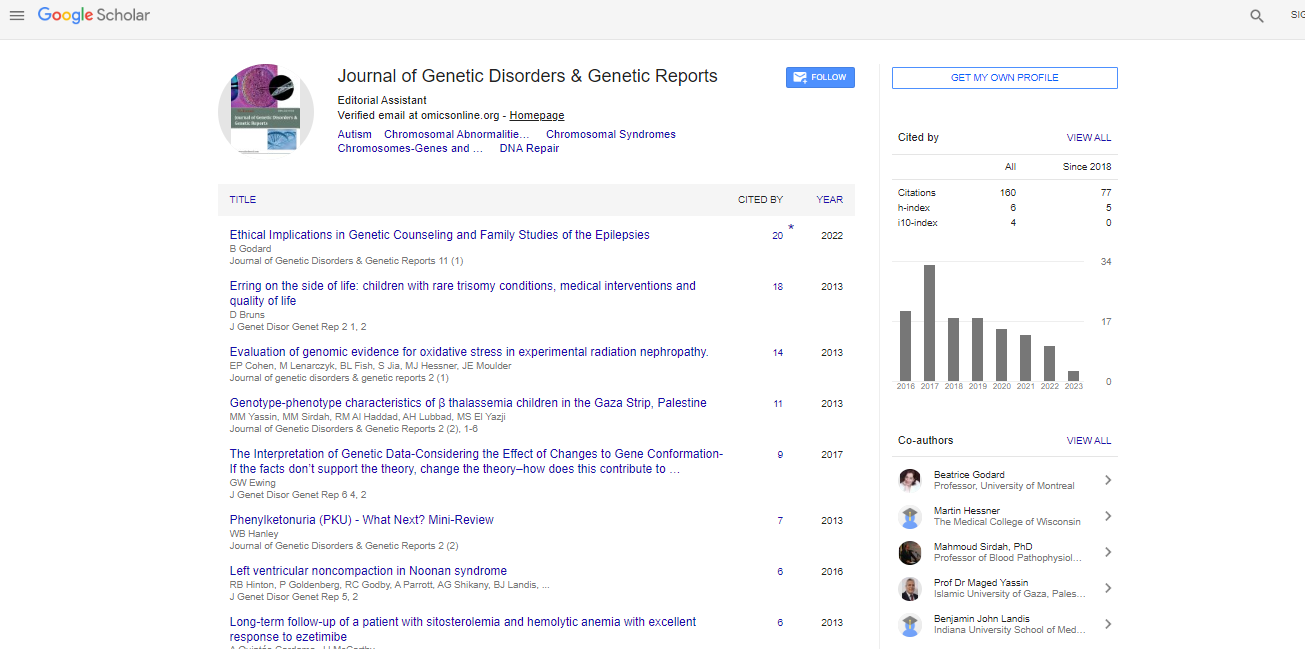Short Communication, Vol: 12 Issue: 2
Genetic Disorders and Therapeutic Interventions: Precision Medicine
Damon Salvatore*
1Department of Hematology, and the Global Health Center, Cincinnati Children’s Hospital Medical Center, Cincinnati OH 45229, USA
*Corresponding Author: Damon Salvatore,
Department of Hematology, and the
Global Health Center, Cincinnati Children’s Hospital Medical Center, Cincinnati OH
45229, USA
E-mail: Damon Salvatore@nd.edu
Received date: 29 March, 2023, Manuscript No. JGDGR-23-99523;
Editor assigned date: 31 March, 2023, Pre QC No. JGDGR-23-99523(PQ);
Reviewed date: 14 April, 2023, QC No. JGDGR-23-99523;
Revised date: 21 April, 2023, Manuscript No. JGDGR-23-99523(R);
Published date: 28 April, 2023, DOI: 10. 4172/2576-1439.1000197
Citation: Salvatore D (2023) Genetic Disorders & Therapeutic Interventions: Precision Medicine. J Genet Disor Genet Rep 12:2.
Abstract
Genetic disorders, resulting from alterations in an individual's genetic material, pose significant challenges to affected individuals and their families [1]. However, with advancements in genetics and molecular biology, therapeutic interventions for genetic disorders have witnessed remarkable progress. Precision medicine, a tailored approach based on an individual's unique genetic makeup, holds immense promise in the diagnosis, treatment, and management of genetic disorders [2]. Genetic disorders arise from abnormalities in an individual's DNA, which can include gene mutations, chromosomal rearrangements, or variations in the number of chromosomes. These genetic alterations can affect protein function, cellular processes, and overall development, leading to a wide range of disorders [3]. Genetic disorders encompass a broad spectrum of conditions, including monogenic disorders caused by mutations in a single gene, chromosomal disorders resulting from changes in chromosome structure or number, and multifactorial disorders influenced by a combination of genetic and environmental factors.
Description
Genetic disorders, resulting from alterations in an individual's genetic material, pose significant challenges to affected individuals and their families [1]. However, with advancements in genetics and molecular biology, therapeutic interventions for genetic disorders have witnessed remarkable progress. Precision medicine, a tailored approach based on an individual's unique genetic makeup, holds immense promise in the diagnosis, treatment, and management of genetic disorders [2]. Genetic disorders arise from abnormalities in an individual's DNA, which can include gene mutations, chromosomal rearrangements, or variations in the number of chromosomes. These genetic alterations can affect protein function, cellular processes, and overall development, leading to a wide range of disorders [3]. Genetic disorders encompass a broad spectrum of conditions, including monogenic disorders caused by mutations in a single gene, chromosomal disorders resulting from changes in chromosome structure or number, and multifactorial disorders influenced by a combination of genetic and environmental factors.
Diagnostic techniques for genetic disorders
Genetic testing: Genetic testing plays a vital role in diagnosing genetic disorders. Various techniques, including targeted gene sequencing, whole-exome sequencing, and chromosomal microarray analysis, allow for the identification of specific genetic alterations associated with different disorders [4].
Prenatal diagnosis: Prenatal genetic testing enables the detection of genetic disorders in the developing fetus. Techniques such as amniocentesis and chorionic villus sampling can provide valuable information about the presence of genetic abnormalities, allowing for informed decision-making and early interventions [5].
Therapeutic interventions for genetic disorders
Gene replacement therapy: Gene replacement therapy aims to correct or replace the faulty gene responsible for a genetic disorder. This approach involves delivering a functional copy of the gene into the affected cells, either through viral vectors or gene editing techniques like CRISPR-Cas9 [6]. Examples include the successful treatment of spinal muscular atrophy and Leber congenital amaurosis.
Pharmacological therapies: In some cases, pharmacological interventions can help manage symptoms or slow disease progression in genetic disorders [7]. This approach may involve the use of medications to target specific molecular pathways or supplementing missing proteins. Examples include enzyme replacement therapy for lysosomal storage disorders and pharmacological chaperones for certain metabolic disorders.
RNA-Based therapies: RNA-based therapies offer innovative strategies for treating genetic disorders. Anti-Sense Oligonucleotides (ASOs) can target specific RNA sequences to modulate gene expression or correct aberrant splicing [8]. Additionally, messenger RNA (mRNA) therapies hold promise for delivering functional proteins by introducing synthetic mRNA molecules.
Stem cell therapies: Stem cell therapies have emerged as a potential approach for treating genetic disorders. Induced Pluripotent Sem Cells (iPSCs) can be generated from patient cells and differentiated into specific cell types affected by the disorder. These cells can be used for disease modeling, drug screening, and potentially cell replacement therapy in the future [9].
Genome editing: Genome editing technologies, such as CRISPRCas9, offer precise and targeted modification of DNA sequences. They hold great potential for correcting disease-causing mutations and restoring normal gene function. However, ethical considerations and safety concerns must be addressed before widespread clinical implementation [10].
Genetic counseling and support: Genetic counseling plays a crucial role in helping individuals and families understand the implications of genetic disorders, including available therapeutic interventions and management strategies.
References
- Pauls SU, Nowak C, Bálint M, Pfenninger M (2013) The impact of global climate change on genetic diversity within populations and species. Mol Ecol 22: 925-46
- Ha TY (2011) MicroRNAs in human diseases: from cancer to cardiovascular disease. Immune Netw 11: 135-54
- Goldmann JM, Veltman JA, Gilissen C (2019) De novo mutations reflect development and aging of the human germline Trends Genet 35: 828-39
- Ridley RM, Frith CD, Crow TJ, Conneally PM (1988) Anticipation in Huntington's disease is inherited through the male line but may originate in the female. Journal of medical genetics 25: 589-95.
- Calin A, Brophy S, Blake D (1999) Impact of sex on inheritance of ankylosing spondylitis: a cohort study. Lancet 354: 1687-90
- Passalent LA (2011) Physiotherapy for ankylosing spondylitis: evidence and application. Curr Opin Rheumatol 23: 142-7
- Sharan D, S Rajkumar J. (2017) Physiotherapy for ankylosing spondylitis: systematic review and a proposed rehabilitation protocol. Current Rheumatology Reviews 13: 121-5
- Sag E, Tartaglione A, Batu ED, Ravelli A, Khalil SM, Marks SD, Ozen S (2014) Paediatric rheumatology. Clin. Exp. Rheumatol 32: 07-113
- Aikawa NE, Sallum AM, Pereira RM, Suzuki L, Viana VS et al (2012) Paediatric rheumatology. Clin. Exp. Rheumatol 30: 445-9.
- Raab A, Sengler C, Niewerth M, Klotsche J, Horneff G et al (2013) Paediatric rheumatology. Clin. Exp. Rheumatol 31: 796-802
 Spanish
Spanish  Chinese
Chinese  Russian
Russian  German
German  French
French  Japanese
Japanese  Portuguese
Portuguese  Hindi
Hindi 



